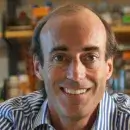
Ronald D. Vale
Dr. Ronald D. Vale is Professor and Vice-Chair of Cellular and Molecular Pharmacology at the University of California, San Francisco, where he is also an Investigator of the Howard Hughes Medical Institute and the William K. Hamilton Distinguished Professor in the Department of Anesthesia. Dr. Vale’s main research focus has been understanding molecular motor proteins and their role in transporting materials within cells. As a graduate student, Vale, along with colleagues James Spudich, Thomas Reese, Bruce Schnapp, and Michael Sheetz, discovered a new type of molecule motor, which they christened “kinesin.” Kinesin proteins have since been shown to be powerful contributors to various types of microtubule associated molecular movement including mitosis, meiosis, and transport of cellular cargo. Vale was appointed to the University of California San Francisco faculty in 1986, he began to use structural approaches in combination with new microscopic methods for tracking single protein molecules to develop a detailed model of how kinesins generates motion. More recently, Vale has focused on dynein, a microtubule motor that remains less well understood than the kinesins. His laboratory also investigates the assembly of the mitotic spindle and the mechanism of T cell signaling The Vale lab has made significant contributions to the field of cell biology, including discovering the severing protein katanin, characterizing dynein's function and structure, and identifying other new proteins that regulate the cytoskeleton. Vale has also made extensive contributions to open science and education. He founded both iBioSeminars.org, a project that produces videos of scientific talks by leading scientists and makes them freely available to students and scientists throughout the world, and IndiaBioscience.org, a website for the life sciences in India. Vale's laboratory developed MicroManager, free and open source software that controls light microscopes. Vale was President of the American Society for Cell Biology in 2012-13. He has been awarded numerous awards including the Massry Prize, Wiley Prize, and the Albert Lasker Basic Medical Research Award. His publications appear in Cell, Nature, and Science.